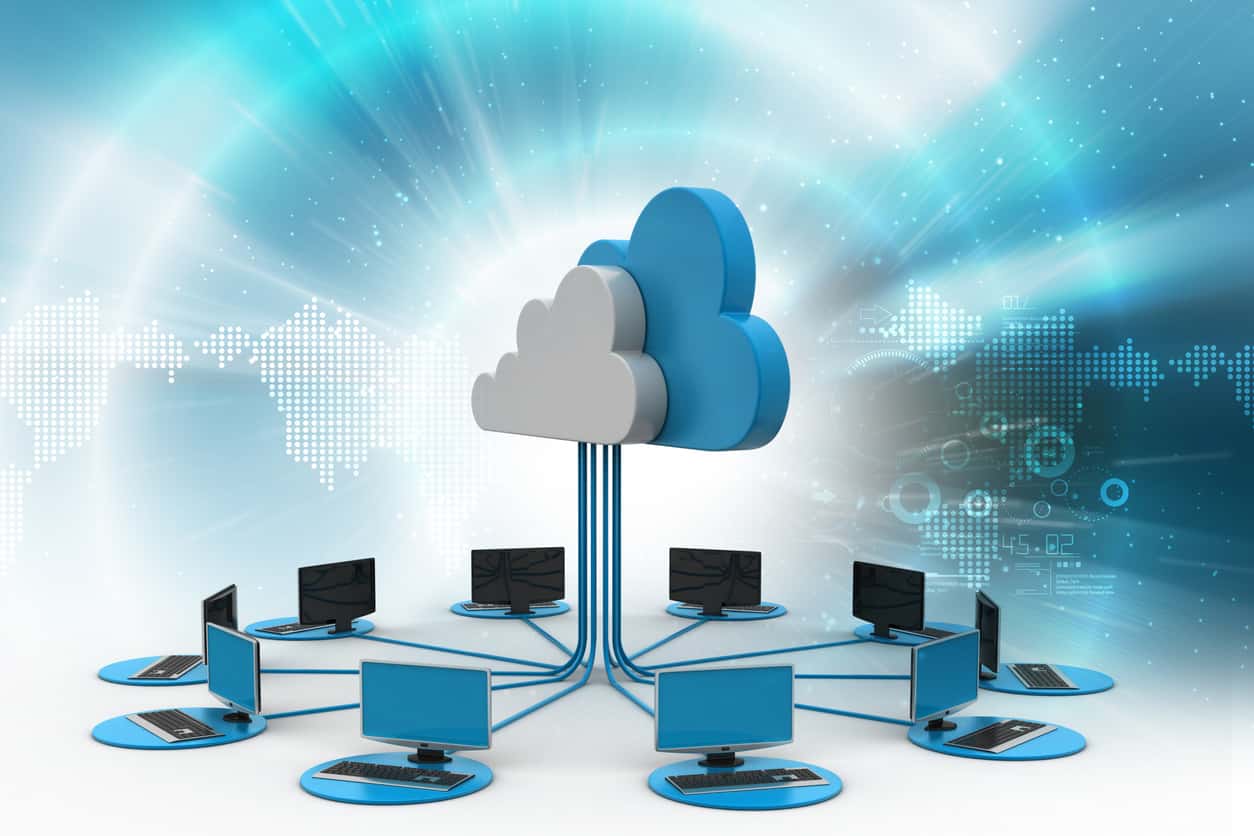- Introduction
- Who is a Cloud System Administrator?
- Cloud Systems Administrator Job Description
- Roles and Responsibilities
- Cloud System Administrator Salary Trends in India/US
- Skills Required to be a Cloud System Administrator
- A day in the life of a Cloud system administrator
- How to Become a Cloud System Administrator?
- What are The Advantages of a Cloud System Administrator Course?
- FAQs
- Conclusion
A Cloud Systems Administrator is accountable for working through a mixed Windows and Unix software ecosystem. The responsibility of the individual is to manage the instances of the cloud infrastructure services and, therefore, the multiple cloud servers. The professional also leads, oversees, and maintains, a multi-user computing environment as per the needs of the organization. The individual throughout this position must have influential technical experience of virtual machines (VM) (IaaS, Writing Code and Software as a Service).
Check out the free certification course on cloud service models.
- Introduction
- Who is a Cloud System Administrator?
- Cloud Systems Administrator Job Description
- Roles and Responsibilities
- Cloud System Administrator Salary Trends in India/US
- Skills Required to be a Cloud System Administrator
- A day in the life of a Cloud system administrator
- How to Become a Cloud System Administrator?
- What are The Advantages of a Cloud System Administrator Course?
Introduction
The cloud systems administrator will need to develop, configure, implement and manage the systems that comprise the underlying cloud platform. The professional assists in fixing public or private cloud systems. They need to find a way to balance workloads and automatically alter the systems as per the prescribed methodology.
The Cloud supervisor is the one who establishes and executes the cloud operations as per the specifications and parameters. they ought to select the cloud providers also keeping in mind the requirements. The technicians should implement cost-effective cloud-based operations which will meet the technical requirements of the business.
Who is a Cloud System Administrator?
A cloud systems administrator produces, manages and troubleshoots the system connections of cloud computing devices.
Job duties include the following:
Administrating the cloud system into patches, recognition and restoration deployments
Monitoring and analyzing network review to match on-demand inquiries
Determining and implementing strategies for cloud-based devices
Building links to and from multiple cloud network standards and managing firewalls
Communicating with IT and non-IT professionals to form sure effective use of all services
A cloud systems administrator makes sure about the seamless distribution of all cloud services to clients and corporations large and tiny. It’s a mid-level position that needs plenty of teamwork with other staff maintaining the big choice of cloud services offered.
In mid-sized and larger companies, there is a possibility for promotion into a senior cloud systems administrator or cloud engineer position which may involve supervising a team of other cloud system administrators or being the architect of the newest cloud networks.
Because a neighbourhood of the service of the cloud is scalability, redundancy and relatively simple access for companies without a fanatical IT team, a cloud systems administrator must have an in-depth understanding of virtual machine technologies.
In addition, because cloud computing can require very different types of principles and software, a cloud systems administrator must be well-versed within the most well-liked cloud providers, platforms and software sequences employed by the official company user.
Cloud system administrators will often operate with cloud engineers. While cloud systems administrators typically concentrate on the day-to-day operational effectiveness of cloud services, cloud engineers are extra involved within the design and sophistication of cloud constructions.
Cloud engineers are often considered more senior to cloud systems administrators and can be your next move along the cloud computing career path.
Cloud Systems Administrator Job Description
The Cloud Systems Administrator can be defined as a post of the Windows Infrastructure and Cloud Collaboration team in Organizational Systems and is essentially liable for the development, arrangement and security of email and Windows OS infrastructure. The team owns campus instances of Active Directory, Windows Servers, Microsoft Office 365, also as Google Suite and other cloud applications. This is often a key position within University IT and is predicted to supply technical expertise during a highly distributed technical environment.
Roles and Responsibilities
Cloud admins have plenty to try to albeit they are not interacting with a company’s IT infrastructure IRL. A senior systems administrator in the telecom industry who claimed to not be named told Computer world. Professionals operating in cloud administrator jobs Create, support, and troubleshoot systems of cloud platforms and computing devices. It sounds simple, but it is a big job with tons of moving parts. A cloud admin’s duties typically include:
Choosing cloud providers and cloud technologies
Configuring and supporting cloud systems
Setting up private clouds
Monitoring patches, permissions, and repair deployments
Creating policies for cloud computing systems
Monitoring network performance and cloud resources
Establishing connections among cloud networks
Integrating cloud systems into current environments
Managing firewalls and overseeing network security
Managing requests for cloud services modifications
Analyzing cloud deployment data
Evaluating and implementing new technologies
Establishing cloud system security procedures, methods, and procedures
Investigating cloud providers, programs, software, and other cloud clarifications
Documenting systems infrastructure
Resolving operational and security issues
Cloud system administrators are essentially accountable for everything, and anything linked with the seamless distribution of all cloud services.
Cloud System Administrator Salary Trends in India/US
It is often hard to nail down just what proportion cloud systems administrator jobs pay because salaries are driven by not only education and knowledge but also by location and market pressures. Nauvoo reports that the standard cloud systems administrator job pays $87,500 per annum. consistent with the Economic Research Institute, however, the typical cloud supervisor salary is closer to $95,000, and ZipRecruiter’s figure is even higher ($97,373). PayScale, on the other hand, reports that the standard sysadmin working in cloud computing earns just $65,835 per annum.
If you would like to land a cloud systems administrator job with a ZipRecruiter-level salary, your best bet is to work at tech companies headquartered in major cities. Earning one or more of the top-paying cloud certifications also will boost your earning potential during this role. But don’t leap out and obtain an academic degree if money is your main motivation. consistent with Salary.com, a cloud administrator with five years of experience and an academic degree earns only about $1,000 quiet one with an equivalent level of experience and an academic degree.
Cloud System Administrator Salary: Based on Company
Companies play an important role when it comes to salary, so if you are in a good company you can make a decent amount using when you can live your life easier.
Company Salary
IBM ₹5L
Capgemini ₹6L
Oracle ₹17L
Infosys ₹8L-₹9L
Accenture ₹8L-₹11L
TCS ₹3L-₹6L
Cloud System Administrator Salary: Based on Experience
Experience is the thing which can make you a good amount of money because with the experience we get to know more about the skills and we refine our work because if we practice a certain work for a long time, we become master in that certain job. So let’s understand how experience is pulling the strings in this scenario.
Experience (In Years) Salary
- ₹347k
2-3 ₹465k
5-6 ₹568k
6-9 ₹789k
Cloud System Administrator Salary: Based on Skills
Skills are important for each job profile because skills you can not work. Skills are the things which pay you the most. If you have the necessary skills, then you can pay your bills. Skills that advance but are market-rate involve VMware ESX, Network Management / Administration, Linux, Microsoft Active Directory and System Administration.
Skills Salary
System Administration ₹403,869
Microsoft Active Directory ₹403,927
Linux ₹461,210
Network Management / Administration ₹362,459
VMware ESX ₹496,329
Skills Required to be a Cloud System Administrator
1. Problem-Solving and Administration
Network admins just have two chief jobs: Solving difficulties and anticipating obstacles before they happen.
This requires a critical mindset and concrete process to approach issues. Red Hat system admin a five-step approach to tackling problems within a system: knowledge, observation, deduction, action, and testing.
2. Networking
More organizations are turning to network virtualization, so understanding SD-WAN, VLAN, SD-branch, and SASE may be a must. Understanding VPNs is additionally essential, especially because the shift to remote work is emphasizing security.
3. Cloud
According to Right Scale’s 2019 State of the Cloud report, 94% of all businesses use the cloud in some form. Sysadmins should remember cloud architecture, the nuances of the main cloud providers like AWS, Azure, and Google Cloud, and therefore the security issues around storing data on the general public cloud.
4. Automation and Scripting
Automated processes have appropriated many of the more tedious network maintenance tasks. However, this means a cloud system administrator can easily neglect the network. Instead, they have to be ready to administer automated processes, and possibly write a couple of their own.
5. Security and Monitoring
Security has become a serious concern on all levels of IT thanks to the spike in phishing, ransomware attacks, and data breaches over the past few years. This is often why security has become a serious supervisor skill. Sysadmins have to address security issues before they begin, like enforcing protocol and educating users about security best practices. As well, they ought to be conversant in monitoring platforms like SolarWinds and Data Dog.
6. Account Access Management
Part of security is managing user accounts. Poor password sanitation can root a disaster, which is why two-factor authentication is becoming indispensable to keeping accounts protected. Cloud System administrators should even be conversant in account management applications and software like Okta or OneLogin, which give a simple and secure way of managing passwords and credentials.
7. IoT/Mobile Device Management
IoT devices are several of the foremost vulnerable devices on the network, thanks to their barebones built-in security. The trend of bring-your-own-device (BYOD) also poses a risk to the network, which suggests sysadmins must skill to secure those devices and protect the system from these new threat vectors.
8. Scripting Languages
The common popular scripting languages for cloud system administrators involve HTML and JavaScript and also recommend Go, Bash, Python, and Node.js, especially during a DevOps environment.
9. Hardware Management
Sysadmins work with physical servers the maximum amount as they are doing with their virtual interfaces. Sysadmins may need to find out physical server connections and racks, manually configure devices like printers, or find ethernet ports.
10. SQL
Structured command language (SQL) is employed to manage databases. It’s wont to write APIs, also to handle structured data. It’s one of the foremost basic and important aspects of management and becoming an increasingly desired skill in sysadmins.
A day in the life of a Cloud system administrator
First of all, everyone will have a special motive to hitch support. I do know many system admins and DBAs leave their job for the Amazon tag and regret later saying, this job isn’t cool and everyone, so before your interview, please know this:
It’s a high tech call centre. you’re expected to require calls, chat with consumers and provide them technical advice. you’ll not be doing any of the cool stuff you probably did earlier (if you’re coming from an engineering job or DBA). you’ll surely gain a really good knowledge of multiple AWS services and therefore the one that you simply are going to be hired in, however, most of the knowledge is going to be theoretical and zip practical in day-to-day life.
Coming to the interview process itself, it vastly depends on the location that’s interviewing you (Seattle features a different format, other sites have different). It isn’t a typical interview like an SDE where you’re given a bunch of CS questions and you would like to unravel them on the whiteboard. there’s no whiteboarding mostly.
It also depends on the support team you’re being hired for. Networking or computer teams (Ec2) have separate interview patterns vs database or big data assistance.
In any case, the fundamentals of OS, networking are critical to the interview. If you’ve got a phone screen, we’ll be trying to find basic/semi-advanced skills of those and your speciality. For instance, if you mention Oracle in your resume and you’re interviewing for the database team, expect a flurry of these questions.
Another important aspect is the Amazon leadership principles. half your interview is predicated on LPs. If you fail to possess scenarios where you are not demonstrating our LPs, you can’t expect to figure here albeit your technical skills are above average (Having extraordinary skills may be a different thing).
The overall interview itself will have 1 phone screen if you’re interviewing within the US and 1–2 if outside the US. The onsite loop is going to be 4 rounds, 2 of which are technical (again divided into OS and networking and therefore the specific speciality of the team you’re interviewing for ) and a couple of them are leadership principles where we test your soft skills and management skills as they’re vital during this job. you would like to possess a robust viewpoint, disagree if it seems valid to try to do so, empathy and be a team player while showing the power to tug off things individually also. These skills are going to be critical for cracking LP interviews.
You will NOT be asked to code or write queries as it isn’t a part of the work, so you’ll consider the theoretical part of the topic and also your resume. we’ll grill you on topics mentioned on your resume to start out with.
How to Become a Cloud System Administrator?
Becoming a cloud system administrator requires mastering a lot of skills so here is the list of those skills.
Unix and Windows
For starters, a cloud administrator should be conversant in both Windows-based and Unix-based computing environments. Cloud deployments often mix both sorts of operating systems, so admins might be able to administer both Linux and Windows VMs running within the cloud.
In addition, cloud administration tools tend to span both sorts of operating systems. Many native cloud administration command-line interface (CLI) tools, like AWS CLI and gcloud CLI, behave tons like traditional Unix-like tools. However, admins may need to run them on a Windows workstation to administer on-premises Windows infrastructure, so it’s useful to be ready to work with both OS families.
Virtualization
Virtualization is a component and parcel of the cloud, as many workloads are hosted on VMs. Thus, understand how virtualization works and know the differences between major virtualization platforms, like Hyper-V, VMware and KVM, to become a cloud admin.
This doesn’t mean you’ve got to be ready to code a hypervisor from scratch. But, know what a hypervisor is, how it’s different from a container and therefore the performance implications of running a workload on a hypervisor rather than on bare metal.
Containers
Because container-based deployment platforms, like Docker and Kubernetes, became so common within the cloud, it is vital to find out this technology to become a cloud admin.
For example, understand when it does and doesn’t add up to use containers. Know the differences between on-premises Kubernetes and managed Kubernetes services like Amazon Elastic Kubernetes Service and Microsoft Azure Kubernetes Service. find out how to define a container runtime and understand the way to store data persistently for containerized applications, especially within the cloud.
Data management
Administering a cloud environment requires managing the info hosted within it. As a decision, cloud administrators require core data administration skills.
While you do not get to have a PhD in data science, know what a database is and the way relational databases compare to NoSQL databases. Explain the distinctions between target and block accommodation, particularly as they pertain to cloud-based storage settings. additionally to the essentials of knowledge backup, skills to plan and manage a backup strategy for cloud data.
Cloud finances
The financial aspects of cloud computing are one among the foremost often overlooked, but critical, facets of cloud administration. Many organizations prefer to run workloads within the cloud because they need to save lots of money. One of a cloud administrator’s key tasks is to deliver their own goal.
Understanding cloud investments means comprehending the ins and excuses of cloud providers pricing standards. Know what data egress and API requests mean, and the way they factor into cloud bills. Understand the differences between pricing for serverless functions and cloud VMs, and be ready to right-size a cloud VM instance to save lots of money. Be conversant in the kinds of VM instances available on most public clouds, also as different data storage tiers and the way to use them to style and run an economical cloud workload.
Infrastructure as code
Except they cherish manual, time-consuming responsibilities, administrators will require to store cloud settings automatically. Thereto end, be very conversant in infrastructure-as-code (IaC) tools, including people who run natively within public clouds, like AWS CloudFormation, and people that are available from third-party vendors, like Ansible. Learn the safety implications of IaC and the way to attenuate potential risks on those platforms.
CI/CD management
Along with comparable plans to IaC, an executive might be prepared to manage a cloud ecosystem that has a CI/CD pipeline. Although this would possibly not likely involve managing pipeline code, understanding how a CI/CD pipeline works, which components factor into it and the way to support a CI/CD pipeline — whether it runs entirely within the cloud or includes both on-premises and cloud-based segments.
What are The Advantages of a Cloud System Administrator Course?
The cloud systems administrator will require to generate, configure, execute and maintain the systems that include the underlying cloud platform. The professional assists in fixing public or private cloud systems. They need to find a way to balance workload and automatically deploy them. The individual should observe and change the systems as per the prescribed ways.
You will learn how to manage the cloud system and use them accordingly.
You will create and deploy all kinds of software.
FAQs
- How a Cloud engineer fits the Industry?
Ans. Cloud engineers are now like the backbone of the industry because the cloud has tried to provide all the computer needs at a very less cost so that the organizations can increase productivity and do whatever the company does.
- Is there any other way to become a Cloud system administrator and any degrees are necessary?
Ans: You have to master all the skills mentioned above without that you cannot become a cloud system administrator. And a degree is not necessary for a cloud system administrator, you just need to have some way to showcase your skills and you are good to go.
Conclusion
Keeping in mind the current scenarios and current technology needs cloud system admins are the best profile for a tech geek. You can master any profile and make a good life out of it.






